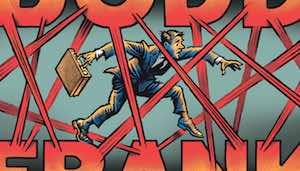By Megan Barth ——Bio and Archives--May 6, 2016
American Politics, News | CFP Comments | Reader Friendly | Subscribe | Email Us
 If it moves, tax it. If it keeps moving, regulate it. If it stops moving, subsidize it. -- Ronald Reagan
Enter Dodd Frank: legislation named after Democrats' Christopher Dodd and Barney Frank, which enacted 2,300 pages of banking regulations. What could have possibly gone wrong with 2,300 pages of new government regulations on banks? This:
If it moves, tax it. If it keeps moving, regulate it. If it stops moving, subsidize it. -- Ronald Reagan
Enter Dodd Frank: legislation named after Democrats' Christopher Dodd and Barney Frank, which enacted 2,300 pages of banking regulations. What could have possibly gone wrong with 2,300 pages of new government regulations on banks? This:
When the Dodd-Frank Wall Street Reform and Consumer Protection Act took effect on July 21, 2010, it immediately caused a sharp partisan division. This staggeringly large legislation--2,300 pages--passed the House without a single Republican vote and received only three GOP votes in the Senate. Republicans saw the bill as ObamaCare for the financial system, a vast and unnecessary expansion of the regulatory state.
Four years later, Dodd-Frank's pernicious effects have shown that the law's critics were, if anything, too kind. Dodd-Frank has already overwhelmed the regulatory system, stifled the financial industry and impaired economic growth.As GSE's, Government Sponsored Enterprises, Fannie Mae and Freddie Mac, brought our country to near financial ruin, more government regulations and bureaucrats were the only remedy to this crisis--according to the Democrat-led congress and their related financial committees. Writes Peter Wallison of the American Enterprise Institute:
It is now clear, however, that government housing policies--implemented primarily by Fannie Mae and Freddie Mac--forced a reduction in mortgage underwriting standards, which was the real cause of the crisis. The goal was to foster affordable housing for low-income and minority borrowers, but these loosened standards inevitably spread to the wider market, building an enormous housing bubble between 1997 and 2007. By 2008 roughly 58% of all U.S. mortgages--32 million loans--were subprime or otherwise low quality. Of these 32 million loans, 76% were on the books of government agencies, primarily Fannie and Freddie, showing incontrovertibly where the demand for these loans originated. When the housing bubble burst, mortgage defaults soared to unprecedented levels. Although the left's narrative placed all blame on the private sector, these numbers show that private firms were responsible for less than a quarter of the problem.
"Franklin Raines earned more than $90 million from 1998 to 2003. Further, the Office of Federal Housing Enterprise Oversight (OFHEO) revealed in 2006 that some Fannie senior executives (including Raines) had manipulated accounting to bolster their pay from 1998 to 2004."Only in political theater could this story be true and end with Franklin Raines riding off into the sunset with $90 million and exonerated of any accountability. Likewise, fast forward to part two in the political theater of 2016. In sweet irony, and in a stunning display of confusing facts with fiction, Stephen Lynch (D-MA) quoted a 2015 Academy Award nominated movie, The Big Short, as grounds to increase regulations and to cast blame on Credit Rating Agencies (CRA's) during an exchange with Thomas Butler, the Director of the Office of Credit Ratings. To clarify, these CRA's are comprised of three companies who are given special authority by regulators to determine how safe a broad variety of loans are for investment purposes. Rep. Lynch accused the CRA's of making record profits without instituting any changes or using their statutory authority to hold themselves accountable and who are partaking in a "pay to play" rating system. The scene Rep. Lynch cites from The Big Short opens with a hedge fund manager named Mark Baum who presses an analyst from Standard & Poor's about why it continued to rate exotic mortgage bonds highly in the face of mounting defaults:
Support Canada Free Press

BAUM: "Can you name one time in the last year when you checked the tape and you didn't give the banks the triple-A percentage they wanted?" S&P ANALYST: "If we don't give them the ratings, they'll go to Moody's, right down the block. If we don't work with them, they will go to our competitors. Not our fault, simply the way the world works."There is one Big Problem using The Big Short as historical fact. The conversation between Baum and the S&P Analyst never happened. No "pay to play" relationship ever existed. Yet Congressman Lynch, much like his predecessors who implemented Dodd Frank, would rather use fiction, or red herrings, as the basis of fact in order to increase government control over moving markets. If Congressman Lynch would like to refer to theater in order to justify his legislative actions, perhaps reality TV documentaries found in the historical libraries of CSPAN would be a good start. But then, as a Massachusetts's Democrat, he would have to point a finger to his former colleague from Massachusetts and another towards Connecticut, in order to find accountability. We all know accountability never has a starring role in political theater. As The Big Short is short on reality, Big Government is short on accountability. Where is Franklin Raines today? In all of my searches, I cannot find where he rode off to, but with $90 million dollars in his bank account, I am sure he is doing just fine.
View Comments
Megan Barth, is co-chair of RedWave America PAC and The Media Equality Project. She serves as national spokeswoman for MediaEqualizer.com, the leading online watchdog for the intersection of Media, Technology and Government. .